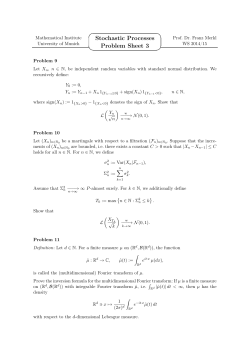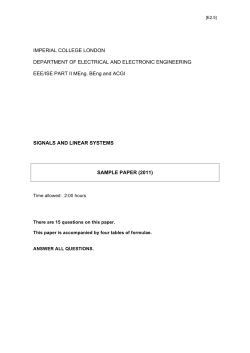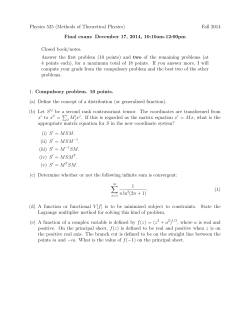
ECE 308 - Cal Poly Pomona
Cal Poly Pomona Electrical & Computer Eng. ECE 308 - 01 Introduction to Discrete Time Signals & Systems http://www.csupomona.edu/~zaliyazici/ece308 Instructor e-mail Office Office Hours Class Time/Place : Dr. Zekeriya Aliyazicioglu : zaliyazici@csupomona.edu : BLDG 9 – 143 : TU 3:00 PM - 4:00 PM, W 3:30 PM –5:30 PM TH 3:00 PM – 5:00 PM : TU-TH 10:00 AM - 11:50 AM / BLDG 9 - 423 Quarter: Fall 2004 Course Description: Time and frequency domain analysis of discrete time signals and systems. 4 lecture/problemsolving. Prerequisite: ECE 209 Note: Students are responsible for satisfying the required prerequisite. Course Objectives • Introduction to sampling and reconstruction, discrete time signals and systems, convolution, difference equation. • Definition of z-transform and inverse z-transform, properties of z-transform, applications of ztransform. • Introduction to discrete-time Fourier series, discrete-time Fourier transform, discrete Fourier transform (DFT) and fast Fourier transform (FFT). Text Book: [1] Digital Signal Processing Principles , Algorithms, and Applications, Proakis, and Manolakis, 3rd Ed. Prentice Hall, 1996, ISBN 0-13-373762-4 Further Reading(s): [1] Digital Signal Processing A Computer Based Approach, Sanjit K. Mitra, McGraw-Hill, 2001, ISBN 0-07-252261-5 [2] Discrete Time Signal processing A. V. Oppenheim and R.W. Scafer, Prentice Hall, 1999, ISBN 013-754920-2. [3] Digital Signal Processing A practical Approach, E. C. Ifeachor and B. W. Jervis, 2nd Ed, Prentice Hall, 2002, ISBN 0-201-59619-9 Course Requirements and Evaluation Procedure 1. Homework(s)/Computer Problems: Homework/computer problems will be assigned ahead of time so that students would have chance to read the related topic(s). Homework/computer problems assignments will be due at the beginning of the class of the class on the date specified. Absolutely no late homework/computer problems will be accepted, if not accompanied with a legitimate excuse. All work on the homework/computer problems assignments must be individual. Homework, Computer Problems, and Quizzes effect the 20% of the final course grade. 2. Exam(s) Note : : Three examinations will be administered. Exam 1 effects the 25% of the final course grade, Exam 2 effects the 25% of the final course grade, and Final Exam effects the 30% of the final course grade. Students are responsible for all materials/announcements presented in class whether they are present or absent. 1 OUTLINE: Week 1 Signals, Systems, and Signal Processing Classification of Signal Concepts of Frequency in Continuous-Time and Discrete-Time Signals Analog-to-Digital and Digital-to-Analog Signal Conversion Week 2 Simple MatLab Tutorial Summary and Problem Solutions Discrete Time Signals Classification of Discrete-Time Signals Simple manipulation of Discrete-Time Signals Week 3 Discrete-Time Systems Input-Output Description of Discrete-Time Systems Block Diagram Representation of Discrete-Time Systems Classification of Discrete-Time Systems Week 4 Analysis of Discrete-Time Linear Systems Discrete-Time Systems Described by Difference Equations and solution Recursive and Nonrecursive Discrete-Time Systems Implementation of Discrete-Time Systems Correlation of Discrete-Time Signals Summary and Problem Solutions MatLab Examples Week 5 Exam 1 The z-Transform Properties of the z-Transforms Week 6 Rational z-Transforms Inverse of the z-Transform The inverse z-transform by power series expansion Week 7 The inverse z-transform by partial-fraction expansion The One-sided z-transform Analysis of Linear Time-Invariant Systems in the z-Domain Summary and Problem Solutions Using MatLab in z-transform Week 8 Exam 2 Frequency Analysis of Discrete-Time Signals Properties of the Fourier Transform for Discrete-Time Signal Week 9 Frequency-Domain Characteristics of Linear Time-Invariant System The Discrete Fourier Transform (DFT) Properties of DFT Week 10 Frequency Analysis of Signals Using the DFT FFT Algorithms Summary and Problem Solution using MatLab 1. Schedule may be subject to change. Please note the announcements in the class, in the class folder, and in the instructor’s web site, etc. 2. Solutions to the problems (exercises, tests, etc.) may be published if time permitting. 2 Course Policies • Students must have the pre/co requisites for EE 308 as given above. • No make-up tests will be given. • Students are encouraged to discuss the course, including issues raised by the assignments. However, the solutions to assignments should be individual original work unless otherwise specified. You may ask a fellow student a question designed to improve your understanding, not one designed to get the assignment done. To do otherwise is to cheat yourself out of understanding, as well as to be dishonorable. • Any case of cheating will result in an F grade for the course. Also, the case may be forwarded to the Department Chair for appropriate disciplinary action. • Use of one information sheet, 8.5” x 11”, one side only, will be allowed during Exam 1, and 2. Two one-sided pages may be used for Final Exam. Information sheets are to be individual effort, and must be turned in with each test. 3
© Copyright 2025


![[ ] sin [ ] - Oregon State University](http://cdn1.abcdocz.com/store/data/000701149_1-0bf1cae8507d705aa8597319f112cba3-250x500.png)










